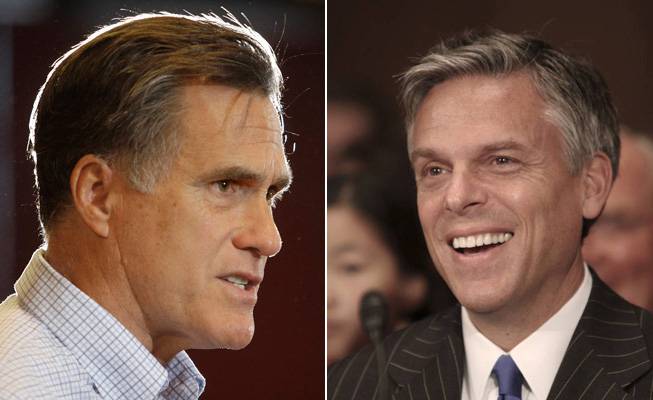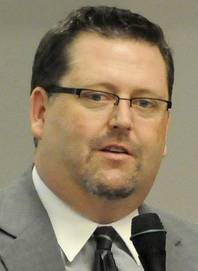
Associated Press photos
Mitt Romney and Jon Huntsman
Thursday, June 23, 2011 | 2 a.m.

Warren Hardy
Sun coverage
Sun archives
- Who is Huntsman? Dropout, ex-governor, diplomat (6-21-2011)
- Huntsman’s family gave nearly $25,000 to Reid last cycle (6-21-2011)
- Mitt Romney ad features Nevadans in attack on Obama (6-21-2011)
- Romney plans just one Nevada debate (6-21-2011)
- Harry Reid: ‘I would favor Huntsman over Romney’ (6-21-2011)
- Republican presidential field starts to cozy up to Nevada GOP (3-23-2011)
- Rep. Joe Heck backs Mitt Romney for president (3-22-2011)
- A perfect GOP candidate is hard to find (3-22-2011)
- Mitt Romney leads in Nevada Republican presidential primary poll (1-11-2011)
When former Massachusetts Gov. Mitt Romney ran for president four years ago, many saw his Mormon faith as a challenge to overcome much the same way John F. Kennedy had to address his Catholicism in the 1960s. A challenge, that is, everywhere but in Nevada — an early primary state with a significant Mormon population.
Indeed, Mormon volunteers turned out in droves to help Romney organize his successful Nevada campaign. Exit polls showed Mormons made up more than a quarter of the vote in the Nevada caucuses, and Romney won 95 percent of their votes.
But as Nevada heads into another presidential election year as a key Western primary state, Romney isn’t the only Mormon candidate with a serious shot at the presidency. Former Utah Gov. Jon Huntsman, who launched his bid this week, will conclude his opening tour with a day courting voters in Reno.
Like Romney, Huntsman hails from a prominent Mormon family. His faith, coupled with his Western roots, has potentially positioned him as Romney’s chief competitor for Nevada.
“It’s very possible they will split the Mormon vote,” said former state Sen. Warren Hardy, a member of the Church of Jesus Christ of Latter-day Saints.
“They are a couple of people who are very alike philosophically and who have some of the same challenges.”
Romney and Huntsman are similar in many ways.
Both made their fortunes as business executives — Huntsman helped lead his family’s chemical manufacturing company, while Romney led and helped rescue business management firm Bain & Co.
Both have fathers who were involved in politics — Romney’s father was governor of Michigan, while Huntsman’s served in the Nixon administration.
But they also followed different life paths.
Romney attended Stanford University before earning his bachelor’s at Brigham Young University. He then headed to Harvard University for business and law school.
Huntsman dropped out of high school to become a rock star, but eventually earned his GED, attended the University of Utah and graduated from the University of Pennsylvania.
Although Romney has had difficulty shedding his stiff persona that leads to awkwardness on the campaign trail, Huntsman is comfortable in a leather jacket and riding motorcycles — a passion he has touted in his campaign kickoff.
The differences reportedly extend to the way they practice their religion.
Romney, true to his straight-laced self, adheres to orthodoxy. In a landmark speech in 2008, he sought to explain his religion to voters, much the way Kennedy explained his religious beliefs to those skeptical of electing the first Catholic president.
“I believe in my Mormon faith and I endeavor to live by it,” he said. “My faith is the faith of my fathers — I will be true to them and to my beliefs.
“Some believe that such a confession of my faith will sink my candidacy. If they are right, so be it. But I think they underestimate the American people. Americans do not respect believers of convenience.”
Huntsman, on the other hand, has described his relationship with the church as “tough to define.”
“I’m a very spiritual person” as opposed to a religious one, “and proud of my Mormon roots,” he told Time magazine last month.
Pressed on whether he is still a member of the church, he answered: “That’s tough to define. There are varying degrees. I come from a long line of saloon keepers and proselytizers, and I draw from both sides.”
It’s difficult to predict how crucial the Mormon vote will be to a Nevada victory this time. Romney’s strong showing in 2008 is somewhat deceptive — Texas Rep. Ron Paul was the only other Republican to seriously work the state that year.
But if the Nevada caucuses come down to the Mormon vote, Huntsman’s hard-to-define relationship with his church could become a political problem.
For Mormons active in their faith, loyalty to the church is important.
“That could be very problematic with LDS folks,” Hardy said. “They certainly don’t like it when you use religion when it’s convenient. And to his credit, he’s not claiming to be this straight-laced LDS person. But if, in fact, he’s not a particularly practicing member of the church, again, all things being equal, that could push a lot of people toward Romney.”
The question becomes how important the Mormon vote will be this year.
A number of factors change that calculus from 2008.
Romney still enjoys strong ties with Nevada Republicans that extend well beyond those of Mormon faith and he’s worked over the past four years to strengthen them.
But Romney likely won’t be the only major Republican candidate organizing the state, meaning other candidates will be driving other GOP demographics to the caucuses, diluting the strength of Mormon caucusgoers.
Turnout is expected to exceed the 44,000 or so that turned out in 2008, when the Nevada Republican Party didn’t take the Silver State’s early primary status as seriously as it does this time.
Regardless, experts say, Mormons remain an important voting bloc in any election.
“Listen, the bigger the campaign, the less influential any subgroup is, but they are more significant in a smaller race,” said Democratic strategist Dan Hart, who ran a strong Mormon outreach campaign as part of former Henderson Mayor James Gibson’s unsuccessful 2006 gubernatorial bid. “And their culture is such that they are very good voters.”

Join the Discussion:
Check this out for a full explanation of our conversion to the LiveFyre commenting system and instructions on how to sign up for an account.
Full comments policy